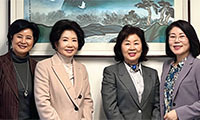목적달성 위해서는 세 가지 요소가 필요
우리 모두가 글로벌 커뮤니티의 구성원이라는 사실, 그리고 다양한 인종들이 포함된 다문화 사회인 미국에서 살고 있다는 사실을 감안할 때, 다문화 교육이 날이 갈수록 중요하게 인식되어 지므로 다문화 교육에 대한 저의 의견을 나누고자 합니다.
다문화 교육은 미국사회에 현존하는 결점과 차별대우 관행을 전체론적 관점에 입각하여 비평하고 다루어 교육을 변화시키는 진보적인 접근 태도입니다. 사회적 정의, 공평, 그리고 모든 학생들이 지역사회, 국가, 세계에 공헌할 수 있도록 학생들의 잠재성을 최대한 개발해 주는 교육의 이념에 근거를 두고 있는 것이 다문화 교육입니다. 다문화 교육은 압박과 부정을 없애고 사회를 변화시키는 기초를 다지는 곳이 바로 학교라는 점을 인식합니다.
다문화 교육의 근본적인 목적은 사회 변화에 영향을 끼치는 것입니다. 이러한 목적을 달성하기 위해서는 3가지 변화의 요소가 필요합니다.
1. 자신의 변화
2. 학교와 학교교육의 변화
3. 사회의 변화
모든 학생들은 스스로 인식하든 인식하지 못하든 간에 인종적 아이덴티티를 가지고 학교에 옵니다. 교사들은 학생들의 인종적 아이덴티티를 인정하고 존중해야 하며 교실에서도 학습활동에 그것을 통합시켜야 됩니다. 즉 교사들은 학생들의 다양한 문화를 무시하지 않고 그 문화의 다른 점을 인정해야 합니다. 또한 학생들도 자기 자신의 인종적인 문화를 아는 것도 중요하지만 클래스의 다른 학생들의 문화도 인정하고 배워야 됩니다.
각기 다른 인종적 아이덴티티를 인정하는 것이 출발점입니다. 서로의 문화를 이해하는 일은 교사와 학생, 그리고 학생과 학생 사이를 연결해 주는 작용을 합니다. 그것은 학생들이 자기 자신과 학습 내용에 대해 얼마나 알고 있는가를 말해주는 기본 받침목입니다. 이 인종적 정체성은 교육과정 동안 지속적인 초점이 되어서 자신의 아이덴티티가 정립되면 국가적 아이덴티티를 개발하는 기초가 됩니다.
개인의 국가적 아이덴티티는 민주적인 이념, 즉 인간의 존엄성, 정의, 공평 등에 대한 이해와 헌신을 요구합니다. 여기서 초점은 민주주의 사회의 유능한 멤버가 되는 것입니다. 개인의 확고한 국가적 아이덴티티는 그의 글로벌 아이덴티티 개발에 필수적인 요소입니다.
우리 사회가 서로 다른 사회에 점점 의존해 가는 요즈음 학교가 세계 전체의 문제점을 다루는 것이 아주 중요합니다. 글로벌 아이덴티티는 학생들에게 우리가 하나의 국가로서 전 세계 사회에 어떻게 잘 속해가는 가를 배우는 기회를 주게 됩니다. <2세 독자를 위해 영문칼럼도 게재합니다.>
Given the fact that we are all members of the ‘global community’ and reside in America, which, as all of us are aware is a ‘pluralistic’ society that encompasses a large variety of ethnic groups, I would like to say a few words about the importance of Multicultural Education:
Multicultural education is a progressive approach for transforming education that holistically critiques and addresses current shortcomings, failings, and discriminatory practices in our society. It is grounded in ideals of social justice, equity, and a dedication to facilitating educational experiences in which all students reach their full potential as learners and as socially aware and active beings, locally, nationally, and globally. Multicultural edu-cation acknowl-edges that schools are essential to laying the founda-tion for the transformation of society and the elimination of oppres- sion and injustice.
The underlying goal of multicultural education is to affect social change. The pathway to ward this goal incorporates three strands of trans-formation:
1. the transfor-mation of self;
2. the transfor-mation of schools and schooling; and
3. he transfor-mation of society.
Every child comes to school with an ethnic identity whether these identifications are conscious or unconscious. This identification must be recognized and respected by the teacher. It must be the basis for the learning activities in the classroom. The point here is to acknowledge differences rather than ignore them. It is equally critical that the children recognize and appreciate their own ethnicity and learn to appreciate those of the other children in the class.
This recognition of individual ethnic identities is the beginning point, it is a connector of both the teacher to the student and the students to each other. It is the basic building block in the learning process which requires knowing where the child is relative to him/herself and the content to be addressed. This ethnic identification is a continual point of focus throughout the education process and is the basis for developing the next level of identification which is a national identification.
The national identity of the individual requires his/her understanding and commitment to the democratic ideals such as human dignity, justice and equality. Here the focus is on becoming effective members of a democratic society. An individual’s strong national identification is essential to his/her development of a global identity.
As our society becomes more and more dependent on other societies, it is critical that the schools address the problems of the world as a whole. The development of the global identification provides the students with the opportunity to see how as a nation we fit into the world society. It allows students to better understand that the actions of a nation must not only be viewed in terms of the implications for that nation but what are the effects on the whole world. Children who have developed both a strong ethnic and national identity should have the perspective to also develop a global identification which should in turn make them better citizens of the world community.
교육상담 문의: DrSuzieOh@gmail.com
수지 오
스마터리빙
more [ 건강]
[ 건강]이제 혈관 건강도 챙기자!
[현대해운]우리 눈에 보이지 않기 때문에 혈관 건강을 챙기는 것은 결코 쉽지 않은데요. 여러분은 혈관 건강을 유지하기 위해 어떤 노력을 하시나요?
 [ 건강]
[ 건강]내 몸이 건강해지는 과일궁합
 [ 라이프]
[ 라이프]벌레야 물럿거라! 천연 해충제 만들기
 [ 건강]
[ 건강]혈압 낮추는데 좋은 식품
[현대해운]혈관 건강은 주로 노화가 진행되면서 지켜야 할 문제라고 인식되어 왔습니다. 최근 생활 패턴과 식생활의 변화로 혈관의 노화 진행이 빨라지고
사람·사람들
more많이 본 기사
- 美, 1만5천 달러 비자 보증금 적용 국가 38개로 확대…베네수 포함
- 대법원, 9일 중대사건 판결…상호관세 운명 결정되나
- Ramen 아닌 Ramyeon…옥스퍼드사전에 K단어 2년 연속 올라
- 지역사회 AI데이터센터 반대 확산…중간선거 쟁점 조짐
- “작년 LA 산불지역 재건축 착수 주택 ⅓뿐…비용·절차 난항”
- 백악관 “트럼프, 그린란드획득 논의중…미군활용은 항상 선택지”
- ‘결혼 28년 차’ 오연수, ♥손지창과 행복한 줄 알았더니.. “걱정없는 집 없어”
- [CES 2026] 젠슨황 “알파마요, 테슬라와 생태계 달라…곧 무개입 자율주행”
- 트럼프, 與의원들에 “중간선거 꼭 이겨야…지면 탄핵소추당할것”
- “그동안 MLB 볼 판정 부정확→ABS 진작 필요했다” 美 CBS 냉철 분석
- 공화 현역 7선의원 별세…하원서 공화 ‘아슬아슬’ 다수당
- 연방정부, 5개 주에 저소득층 아동 예산 보류… “사기 우려”
- CES 2026 ‘통합 부산관’ 운영…13개 기업 혁신상 수상
- ‘안면 인식’으로 불체자 확인·체포한다
- 머스크의 xAI, 엔비디아 업고 200억달러 자금 추가 조달
- “美, 베네수와 원유 수출방안 논의”…석유 제재 해제 수순 전망
- 니콜 키드먼·키스 어번, 공식 이혼…19년 결혼 마침표
- [화제] 참치 한 마리에 ‘325만불’… 역대 최고가 경신
- 메타, 디스플레이 스마트안경 글로벌 출시 연기…”재고 부족”
- 렌트 3% 상한시대… LA 주거정책 ‘대변혁’
- [CES 2026] 젠슨 황 “메모리 공급부족 걱정안해…HBM4는 우리가 독점사용”
- 트럼프 “베네수 원유 최대 5천만배럴 美에 인도해 시장가에 판매”
- 폭우 후 기온 내려가 주말까지 맑고 쌀쌀
- 李대통령, 상하이 임시정부 청사 방문…3박 4일 국빈방중 마무리
- 뉴욕증시 연초 랠리 지속…다우지수 첫 49,000선 돌파 마감
- “美국무, 그린란드 군사작전 검토설 부인… ‘매입이 목표’ 발언”
- 故 안성기 장남인 미술가 안다빈, 아버지를 보내며..
- [신년 집중기획/ 2026 새해 이렇게 바뀐다 - 주택] 아파트 냉장고 제공 ‘의무화’
- “그린란드 일, 덴마크·그린란드가 결정”…유럽, 트럼프 견제구
- 트럼프 “마두로 체포작전 전술적으로 훌륭…쿠바병사 많이 죽어”
- 브라운대·MIT 총격범 “3년 계획…사과 않을 것” 영상
- [CES 2026] 10초 카운트다운에 환호성…전시장 개막부터 ‘북적’
- “물가와 상관없다” 더니… 트럼프, … 1
- 李대통령 방중기간 日제재 발표한 中…한미일 ‘갈라치기’ 시도?
- 美국무부 “이것은 우리의 반구”…서반구 장악 의지 노골화
- TSA, 승객정보 ICE 공유 국내선 탑승자들도 체포
- 송지우, 목욕탕서 팬과 아찔한 만남.. “나체로 라이브 감행”[우발라디오]
- 항공 여행객 정보 ICE와 공유 “비시민권자 비행기 탑승시 주의”
- “위대한 인물” NYT, 故 안성기 부고 기사.. ‘장남’ 안다빈 공유
- 올해 VA 페어팩스 집값… “싱글홈 웃고 콘도는 글쎄”
- 75세 박원숙, 분장실서 쓰러졌다 “쉬어야 한다는 자각 못해”
- 빛 잃은 ‘보석의 제왕’… 금 2배 뛸때 다이아 반토막
- 포드·GM, 작년 美신차판매 6%↑…도요타·현대차도 선전
- ‘1위 유튜버’ 미스터비스트, “뉴진스 도와달라” 요청에 남긴 한 마디
- 도널드 W 부시와 이라크 전의 추억
- ‘親트럼프’ 연준이사 “금리가 경제 발목…올해 1%P 내려야”
- [美 마두로 축출] 이스라엘도 하메네이 노릴까… “이란 시위진압 실수 기다릴 수도”
- 트럼프 “석유회사들 만날 것”…베네수 석유이권 확보 속도내나
- “생닭 뜯는 故 안성기, 경악스러워”..배현진, 조문 태도 논란
- “올해 창립 36주년”
1/5지식톡

-
 미 육군 사관학교 West Poin…
0
미 육군 사관학교 West Poin…
0https://youtu.be/SxD8cEhNV6Q연락처:wpkapca@gmail.comJohn Choi: 714-716-6414West Point 합격증을 받으셨나요?미 육군사관학교 West Point 학부모 모…
-
 ☝️해외에서도 가능한 한국어 선생님…
0
☝️해외에서도 가능한 한국어 선생님…
0이 영상 하나면 충분합니다!♥️상담신청문의♥️☝️ 문의 폭주로 '선착순 상담'만 진행합니다.☎️ : 02-6213-9094✨카카오톡ID : @GOODEDU77 (@골뱅이 꼭 붙여주셔야합니다…
-
 테슬라 자동차 시트커버 장착
0
테슬라 자동차 시트커버 장착
0테슬라 시트커버, 사놓고 아직 못 씌우셨죠?장착이 생각보다 쉽지 않습니다.20년 경력 전문가에게 맡기세요 — 깔끔하고 딱 맞게 장착해드립니다!장착비용:앞좌석: $40뒷좌석: $60앞·뒷좌석 …
-
 식당용 부탄가스
0
식당용 부탄가스
0식당용 부탄가스 홀세일 합니다 로스앤젤레스 다운타운 픽업 가능 안녕 하세요?강아지 & 고양이 모든 애완동물 / 반려동물 식품 & 모든 애완동물/반려동물 관련 제품들 전문적으로 홀세일/취급하는 회사 입니다 100% …
-
 ACSL 국제 컴퓨터 과학 대회, …
0
ACSL 국제 컴퓨터 과학 대회, …
0웹사이트 : www.eduspot.co.kr 카카오톡 상담하기 : https://pf.kakao.com/_BEQWxb블로그 : https://blog.naver.com/eduspotmain안녕하세요, 에듀스팟입니다…
케이타운 1번가
오피니언
 민경훈 논설위원
민경훈 논설위원도널드 W 부시와 이라크 전의 추억
 황의경 사회부 기자
황의경 사회부 기자 타국에서, 다시 ‘우리’를 생각하다
 박원곤 이화여대 북한학과 교수
박원곤 이화여대 북한학과 교수 [백상논단] 붉은 말의 해, 한반도에 다시 오는 분기점
 홍용희 수필가
홍용희 수필가 [화요칼럼] 내 안의 바위
 송용창 / 한국일보 논설위원
송용창 / 한국일보 논설위원 [지평선] 베네수엘라 석유 암투
 조동례
조동례 ‘달 도둑’

Crinks 세력이 크게 꺾이는 그런 해가…
 윤경환 서울경제 뉴욕 특파원
윤경환 서울경제 뉴욕 특파원 60년 만 ‘투자 귀재’ 없는 첫 주
 데이빗 이그나티우스 워싱턴포스트 칼럼니스트
데이빗 이그나티우스 워싱턴포스트 칼럼니스트 [데이빗 이그나티우스 칼럼] 신년맞이 퀴즈: 2026년에는 좋은 일이 있을까?
1/3지사별 뉴스

맨하탄 연방법원에 출두한 마두로 대통령 “나는 납치됐다”
미군에 의해 체포돼 부인과 함께 미국으로 압송된 니콜라스 마두로 베네수엘라 대통령이 5일 맨하탄 연방법원에 처음 출두해 모든 범죄 혐의를 부인…
이민단속에 안면인식 앱까지 동원

“헌법 무시”Vs“안보 강화”
미국이 3일 나콜라스 마두로 베네수엘라 대통령을 군사 작전으로 체포한 사건과 관련해, 워싱턴 지역 정치권은 상반된 반응을 보이고 있다. 정치인…
DC 보안 강화, 마두로 체포로 인해 ‘초비상’

‘안면 인식’으로 불체자 확인·체포한다
트럼프 행정부의 초강경 이민 단속 기조 속에 불법체류자 단속을 위해 안면 인식 기술이 본격적으로 활용되고 있어 논란이 커지고 있다. 4일 월스…
중부 캘리포니아 ‘한인 이민사’ 나왔다

오늘 하루 이 창 열지 않음 닫기 



















































.png)


댓글 안에 당신의 성숙함도 담아 주세요.
'오늘의 한마디'는 기사에 대하여 자신의 생각을 말하고 남의 생각을 들으며 서로 다양한 의견을 나누는 공간입니다. 그러나 간혹 불건전한 내용을 올리시는 분들이 계셔서 건전한 인터넷문화 정착을 위해 아래와 같은 운영원칙을 적용합니다.
자체 모니터링을 통해 아래에 해당하는 내용이 포함된 댓글이 발견되면 예고없이 삭제 조치를 하겠습니다.
불건전한 댓글을 올리거나, 이름에 비속어 및 상대방의 불쾌감을 주는 단어를 사용, 유명인 또는 특정 일반인을 사칭하는 경우 이용에 대한 차단 제재를 받을 수 있습니다. 차단될 경우, 일주일간 댓글을 달수 없게 됩니다.
명예훼손, 개인정보 유출, 욕설 등 법률에 위반되는 댓글은 관계 법령에 의거 민형사상 처벌을 받을 수 있으니 이용에 주의를 부탁드립니다.
Close
x